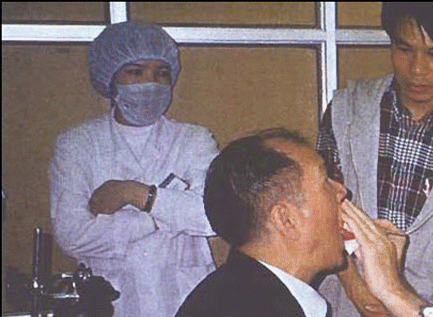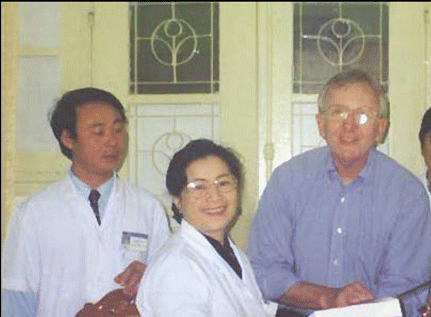The otolaryngologist discusses a decade of educational visits to Vietnam and Cuba
Explore This Issue
June 2006In the world of humanitarian efforts, giving money is relatively easy. Time can be a precious commodity, especially when it involves traveling to distant places, jet-lag, and culture shock. Yet this is exactly the gift that Byron J. Bailey, MD, has given repeatedly over the last 10 years in visits to Vietnam and, more recently, to Cuba.
In a recent phone interview, Dr. Bailey discussed his visits, in which he and the members of the teams accompanying him have provided training to the otolaryngologists of those countries. Dr. Bailey is the Chairman Emeritus of Otolaryngology at the University of Texas Medical Branch in Galveston. In 2003 the Texas State Legislature honored him for these humanitarian visits.
Building Relationships, Improving Resources
The organization that sponsors the trips is Resource Exchange International (REI), and Dr. Bailey serves on the organization’s board of directors. Two branches of REI, REI-Vietnam and REI-Cuba, coordinate the respective activities. REI’s underlying philosophy is to build relationships that will help the people in the visited country continue the work of improving their resources. (For more information, visit www.reiinc.org .)
I had never done anything like this, and I thought I’d probably go one time and that would be it, he said. He has visited Vietnam 11 times and Cuba six times. I saw physicians working hard to do everything they could in very primitive circumstances. It wasn’t something I could walk away from and never go back and do something about. In reflecting on all that, it just seemed appropriate to try to make a contribution. I think that’s what people are put here for.
He urges his fellow otolaryngologists to get involved in similar efforts, whether or not they involve travel abroad. I would urge people to get involved in activities like this for what it will do for [them] as well as what [they] will do for others, he stressed.

Education in Vietnam
In an editorial that was published in The Laryngoscope in 1997 (107(9):1153-1155), Dr. Bailey set out several goals for improving the practice of otolaryngology in Vietnam. We have far exceeded those goals. We were trying to help modernize the patient care training programs in our specialty in Vietnam, he said. We made our home study course available to the Vietnamese without charge. We asked them to identify some who would be leaders for three to six months at a time. We had over 30 of those faculty come to the United States and stay in our homes. They trained in our hospitals in the day and studied in the evening.
After being invited by the Vietnamese otolaryngologists, several otolaryngologists in the United States went as an initial team to Vietnam in April 1996, under the leadership of Jack Hough, MD, who founded the Hough Ear Institute in Oklahoma City, Okla. The goal was to send a team from the United States for two weeks every year to provide training. We now have three teams that work in the teaching hospitals, Dr. Bailey said. He recently completed his eleventh trip. We have distributed copies of the three main journals. The Laryngoscope is going to five or six centers in Vietnam. Teaching videos, slide sets, and instruction manuals are free of charge.
Brent Senior, MD, and David Parsons, MD, now organize the visits. Dr. Senior is Associate Professor of Otolaryngology- Head and Neck Surgery at the University of North Carolina in Chapel Hill, and Dr. Parsons is in private practice in Greenville, SC.
Bringing Dramatic Changes
There have been dramatic changes since our first visit, Dr. Bailey said. When we first went, patients were getting the care that patients in the United States got in the 1940s. Now they’ve moved up to the 1980s in areas that aren’t high-tech. They were cleaning and re-using surgical gloves many times, even when they had holes. On the first trip, there were no electronic monitors in the recovery rooms, just beds with nurses observing the patients. In some of the hospitals, patients were wheeled out of the operating room and out in the hall to recover. That’s quite a bit different now, far better.

On the first visit, the otolaryngology team perused the medical libraries and saw that the most recent journals had been published in 1970. Several major hospitals now have modern libraries, hold grand rounds, offer lectures, and have faculty conducting original research.
I know from what the otolaryngologists have said that our visits have greatly improved their concept of teaching, Dr. Bailey said. They have a lot more equipment that they wouldn’t have had to work with otherwise. The visiting teams have donated much of the equipment. They say our interest in them has given them a lot of hope that people in other countries care about them.
The changes in the practice of otolaryngology have occurred within the context of overall changes in Vietnam, Dr. Bailey said. When we first went, almost all the traffic was bicycles in the north, he said. It’s now motorbikes and cars.
One of the indications that things have improved dramatically is that in August 2007, the Association of Southeast Asian Nations (ASEAN) Otolaryngology Congress will be held in Ho Chi Min City.
‘I would urge people to get involved in activities like this for what it will do for (them) as well as what (they) will do for others.’
Trust Builds over Time
Charles Krause, MD, who accompanied Dr. Bailey on two visits to Vietnam, noted how the Vietnamese otolaryngologists’ trust in their colleagues from the United States has continued to build over time. Dr. Krause was the Chair of the Otolaryngology Department at the University of Michigan, where he was also the Senior Associate Dean of the Medical College. He is now retired and lives in Marco Island, Fla.
Like Dr. Bailey, he was struck by the changes in the country overall between the first and second visits he made, and the increased presence of cars and motorcycles. You could tell the common people were much better off than previously, he said.
Recalling the contrast in medical facilities between the two visits, Dr. Krause remarked, The facilities and equipment were 50 years behind what we’re used to. The second time, they had endoscopes and cameras. However, repairing broken equipment was still problematic.
Lingering Impact of the War
The Vietnam War is still a presence, and participants on both sides can meet in these exchanges. On our second visit, one of the otolaryngologists who had been a pilot in the Vietnam War had actually flown out of the base just outside of Ho Chi Min City, Dr. Krause said. He talked about the fact that, every day, there was a big open field off the runway. He wanted to go see the tunnels that exist there. He was shocked to see the field that he flew over twice every day was completely undercut with tunnels. The enemy was underground the whole time he was flying.
Conversely, one of the physicians they met in Hanoi had been a North Vietnamese army surgeon. The physician described performing surgery in underground tunnels that had first been built when the Vietnamese were fighting the French.
They had the operating room within the tunnels in such a way that air could circulate through it, Dr. Krause said. It was set up so that it could be kept reasonably clean, if you can imagine the difference between a real operating room and a dug-out area. This was a place they could do surgery without being detected.
Visits to Cuba: So Near and Yet So Far
The teams visited Cuba for the first time six years ago, and again, Dr. Bailey has visited every year since then. On the one hand, those visits are easier because Cuba is so close geographically; therefore, the long travel time and jet-lag associated with trips to Vietnam are not an issue. Obviously, other obstacles make visits to Cuba more problematic, though.
Those trips have been very exciting, but they move more slowly because none of their physicians can come here and work in our hospitals, Dr. Bailey said, noting the barrier created by the poor diplomatic relations between the United States and Cuba, and the fact that visiting Cubans are given asylum and may be tempted to defect. A few Cuban physicians have come to meetings in the United States after arrangements have been made to make certain they will return. REI-Cuba makes the visa arrangements for teams that visit from the United States and runs interference with the bureaucratic hassles that can arise from either government.
However, he stressed that the difficulties are only between governments and not among individuals. We’ve been welcomed in both places without any hostility, Dr. Bailey said. On our last trip to Cuba we were able to visit a cochlear implant rehabilitation center that was almost as good as one in the United States. However, he added that such sophistication is not typical of Cuban health care.
Intelligence and Compassion
Seeing the intelligence and compassion of the physicians in the visited countries was very moving to him, he noted. It’s so easy to get dissatisfied and disgruntled, but when you see the situations that our colleagues in other countries are dealing with, you see how fortunate we are in this country, he said. We’re working with doctors who will never have enough money to own a car-they’ll be riding a motorbike for the rest of their careers. Something changes when you see that.
An Illustrious Career, at Home and Abroad
Long before Dr. Byron J. Bailey began traveling to Vietnam and Cuba to share his knowledge and experience with otologaryngologists overseas, he was known at home as a dedicated and compassionate clinician, a mentor for many US otolaryngologists, and a prominent leader for the specialty.
Dr. Bailey earned his undergraduate degree from the University of Oklahoma, and went on to receive his MD from the Medical School there in 1959. He completed his residency at the University of California-Los Angeles and joined the UCLA faculty, where he initiated a residency training program. In 1986, he left California in order to found the otolaryngology-head and neck surgery department at the University of Texas Medical Branch in Galveston. He stepped down as Chair of the department in 2003, and was appointed Chair Emeritus the following year.
Dr. Bailey has published over 200 journal articles and book chapters, in addition to authoring or editing 15 books, including the new fourth edition of Head & Neck Surgery-Otolaryngology (Lippincott Williams & Wilkins, 2006). He has also served as editor of the Archives of Otolaryngology-Head and Neck Surgery, the Year Book of Otolaryngology-Head and Neck Surgery, and The Laryngoscope during his career.
His numerous professional honors include Triological Society Gold Medal, a Presidential Citation and the Distinguished Award for Humanitarian Efforts from the American Academy of Otolaryngology-Head and Neck Surgery, and a special commendation from the Texas State Legislature.
©2006 The Triological Society
Leave a Reply